Articles about reggae music, reviews, interviews, reports and more...
Content Over Hype - Assassin on a Dancehall Mission

Content Over Hype - Assassin on a Dancehall Mission
Assassin aka Agent Sasco at Rototom Sunsplash Reggae University Day 1.
Day one of the 2016 Reggae University Series opened with a lively conversation between two lyricists in their chosen fields. Rockstone deejay Assassin AKA Agent Sasco, dressed in signature black, debated the balance of content vs hype in dancehall with UWI academic Professor Carolyn Cooper, her close cropped hair dyed parrotfish blue. Both were introduced with suitable fanfare by Riddim magazine’s Ellen Koehlings, who led the discussion with her partner Pete Lilly, supported by fellow panellists, the Italian veteran journalist Pier Tosi and the author David Katz.
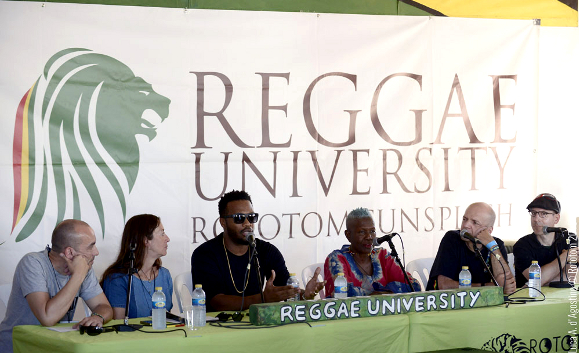
As they batted the question around became clear that the two speakers had subtly different definitions of hype. Assassin suggested hype could boost artists of substance. He gave the example of Chronixx who had “got a lot of coverage but the coverage was deserved” to predictable audience applause. Cooper differentiated between coverage and hype, asking if hype could be positive.
Assassin described how hype had benefitted him as a youth when Spragga Benz used the then unknown teenager’s lyrics for the tune Shotta on the Street Sweeper rhythm. The buzz around the track got the attention of Bounty Killer, who Assassin imitated perfectly. “It wasn’t a commercial hype but it opened the door”. He explained that hype happened in increments and that once he had built a following in Jamaica, “international hype came from the Diwali rhythm and the song Ruffest and Tuffest”.
“I love the concept of incremental hype” said Cooper, “It’s not an all or nothing, one shot thing”.
Koehlings recalled Assassin’s early hit Girls Gone Wild and its suggestive video, complimenting him “You could have chosen to be a deejay of girl tunes but you chose another path”.
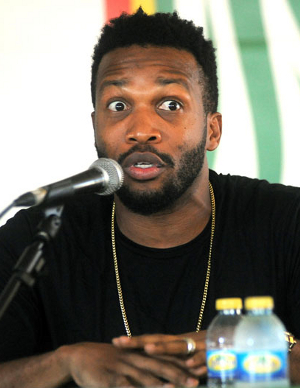 His response was thoughtful. “I started my career at 16. My mentality then was that of a teenager but I grew”.
His response was thoughtful. “I started my career at 16. My mentality then was that of a teenager but I grew”.
He said his mother initially wasn’t happy with him hanging around recording studios and that he had to think carefully about how to approach the business. A lot of people in his community of Kintyre, St Andrew “had been deejaying since the devil was a boy and not getting anywhere”.
He put a time limit on his success, vowing not to ignore the signs if his career wasn’t to be. He also vowed to hold true to certain principles. “I am not going to lose who I am to the industry. It helps to have people around you who help steer you on course”.
He corrected Ellen when she suggested he had changed his name mid-career to Agent Sasco (an alter ego he had taken on because “Assassin” wasn’t so easy to Google). “I was always Assassin” he clarified, likening it to a sub-brand: “You have Coke and Diet Coke”.
“Why did you choose the name Assassin?” asked Cooper. “It was pre 9/11 so it wasn’t as sensitive back then,” he clarified “I was a lyrical assassin back in high school”.
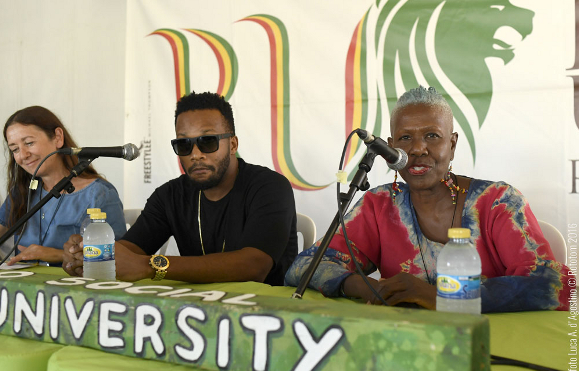
This set up Cooper to make a point that has been vital to her academic writing. “Dancehall lyrics are not meant to be taken literally. Why are these the only poets who are not allowed to use metaphor?” Assassin concurred “At a soundclash no one calls the FBI”.
The biographical segment gave way to the core topic when Koehlings gave a defence of hype within dancehall. “Hype can be positive. It can create energy in the audience. It can be cathartic.”
She also praised pioneering female deejay Lady Saw saying that when she first saw the original queen of slackness she was inspired. “People say that women in the dancehall dress for the male gaze” added Cooper “A lot of women live vicariously through Lady Saw. They are distressed that she found the Lord!” referring to her retirement from secular music.
“Here’s an example of how hype can work,” countered Assassin, drawing an analogy with sports “Usain Bolt goes to the Olympics but he delivers. But if a sprinter is being followed by cameras and all over Twitter but he can’t deliver – it’s a problem. We need content WITH hype – not without”.
“You can’t take hype out of the dancehall” said Lilly when the applause had subsided. “Just don’t BELIEVE your own hype”.
“My old manager Donovan Germain said ‘Don’t believe your own PR’” agreed Assassin. “’Mi the baddest deejay’ That’s what you’re selling – don’t buy it”.
“But what if you are the baddest deejay?” teased Cooper. “To be true to the craft you have to have humility” he replied, lamenting the post-Vybz Kartel dancehall perception that “One man must run the show. Why not have ten people at the top like they do in hip hop?” Lilly questioned the notion that one man should dominate when dancehall was “a juggling music. Many man on one rhythm”.
The mention of hip hop allowed Cooper to ask about Assassin’s uncredited appearance on rapper Kendrick Lamar’s politically charged The Blacker The Berry. He recalled how another guest spot on Kanye West’s Yeezus led to the link through his Canadian friend, Kardinal Offishall. “I try to find ways to represent the music by mixing genres and fanbases”.
Ellen then moved away from dancehall to Assassin’s critically acclaimed third album Theory of Reggaetivity. Why did he decide to do an all reggae record? “Reggae is hype! I always wanted to do reggae” he explained “It was more and more what I felt”.
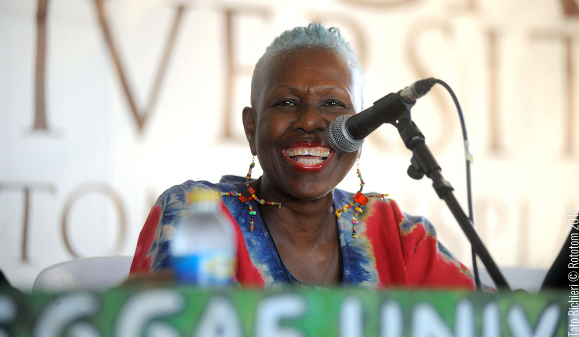
“You’re getting old” jibed Cooper, demonstrating the no holds barred humour of two Jamaicans in conversation that had enlivened the debate thus far. “That too” he laughed “I’ve been a deejay since I was four. It was natural to take on the challenge.”
“How do you approach the challenge of doing reggae?” asked Katz who had let the more dancehall centric panellists take charge until this point. “I disconnected myself from any outcome” Assassin responded “I didn’t care if it would sell. But it went to number two on the iTunes reggae chart and number three on the Billboard chart. My dancehall albums never achieved that. People sincerely feel this project and I’m happy about that”.
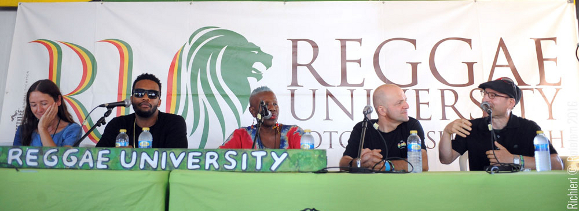
Seeing some hesitance on the part of the audience when Koehlings opened questions to the floor, Cooper saw the opportunity to solicit input from her UWI colleague Dr Dennis Howard “because him know the ting”. Howard had no such fear, stating “You can’t look at hype as negative. Hype is an essential part of the industry.” He also questioned whether every artist needed substance. “Sometimes frivolous music is OK” he said citing the success of Meghan Trainor’s All About The Bass despite its “Idiot lyrics”. He then asked both guests which was more important – the hype or the hit factor?
“I would say substance,” said Cooper “Hype can be manufactured but talent cannot”.
“My goal is substance,” stated Assassin “I make music for my great grandchildren to hear”.
“Are you saying a tune like Girls Gone Wild has no substance?” pounced Howard.
“Girls Gone Wild is content!” pressed Cooper “Don’t devalue sexuality in dancehall!”
Assassin conceded that the song had “a significant place in my foundation” but “it was still a song about a beach party! I’m talking about music that can free up a nation”.
“Without girls going wild there is no nation” said Cooper, perhaps feeling he was playing up to a European crowd.
The grilling inspired a final tough question from an audience member on the subject of believing one’s own hype: “How can you achieve without believing in yourself?”
Assassin had a strong answer to this one, however. “I went into Donovan Germain’s Penthouse studio as a teenager believing I was the best. I voiced a rhythm and Germain said I was off key. If I thought I was the best I would have stormed out of the place. Instead, I did push-ups when people said I was sounding out of breath. I trained my voice when people said I was off key. Believe in yourself but be ready to learn.”
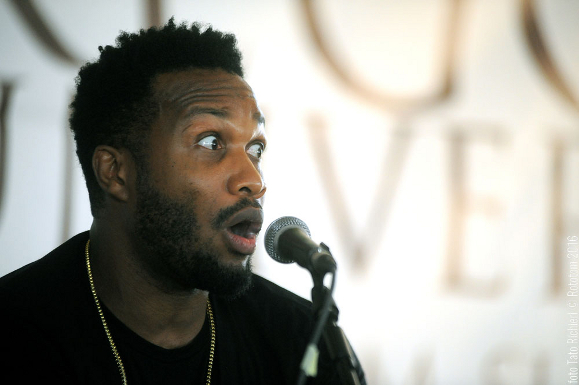
Read more about this topic
Comments actually desactivated due to too much spams
Browse by categories
Recommended Articles
Latest articles
Recently addedView all
© 2007-2026 United Reggae. All Rights Reserved. Reproduction in whole or in part is prohibited. Read about copyright
Terms of use | About us | Contact us | Authors | Newsletter | A-Z














